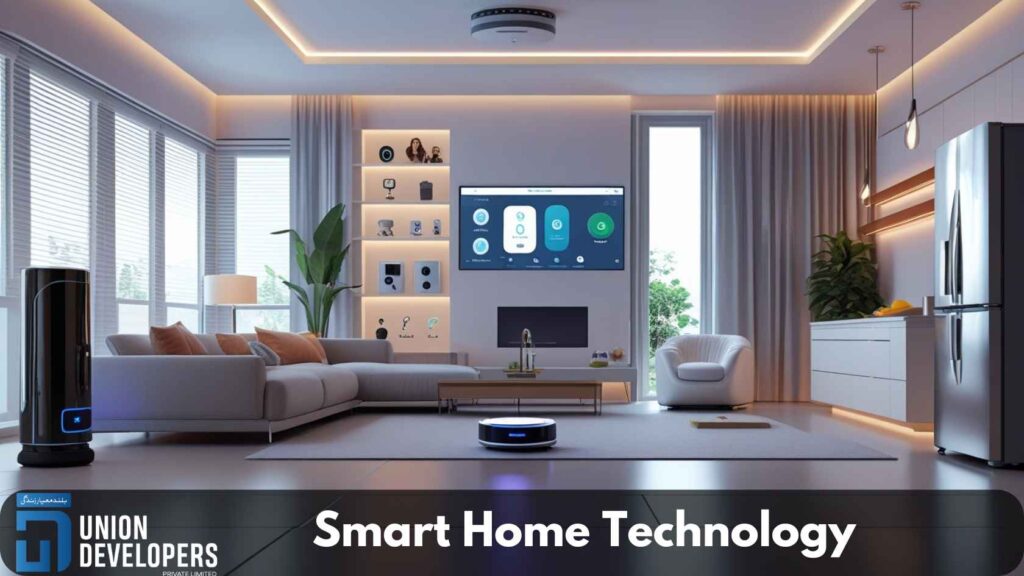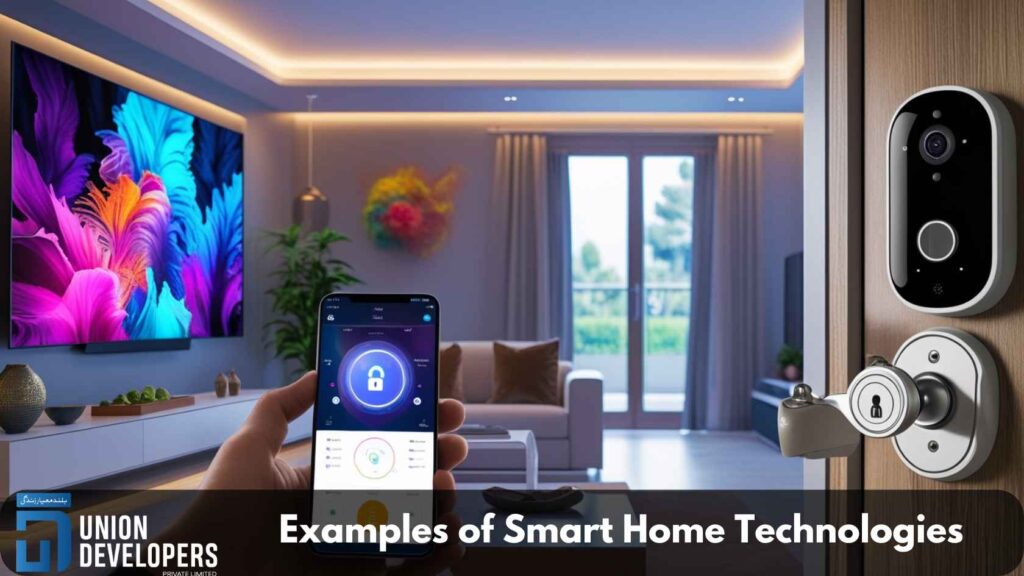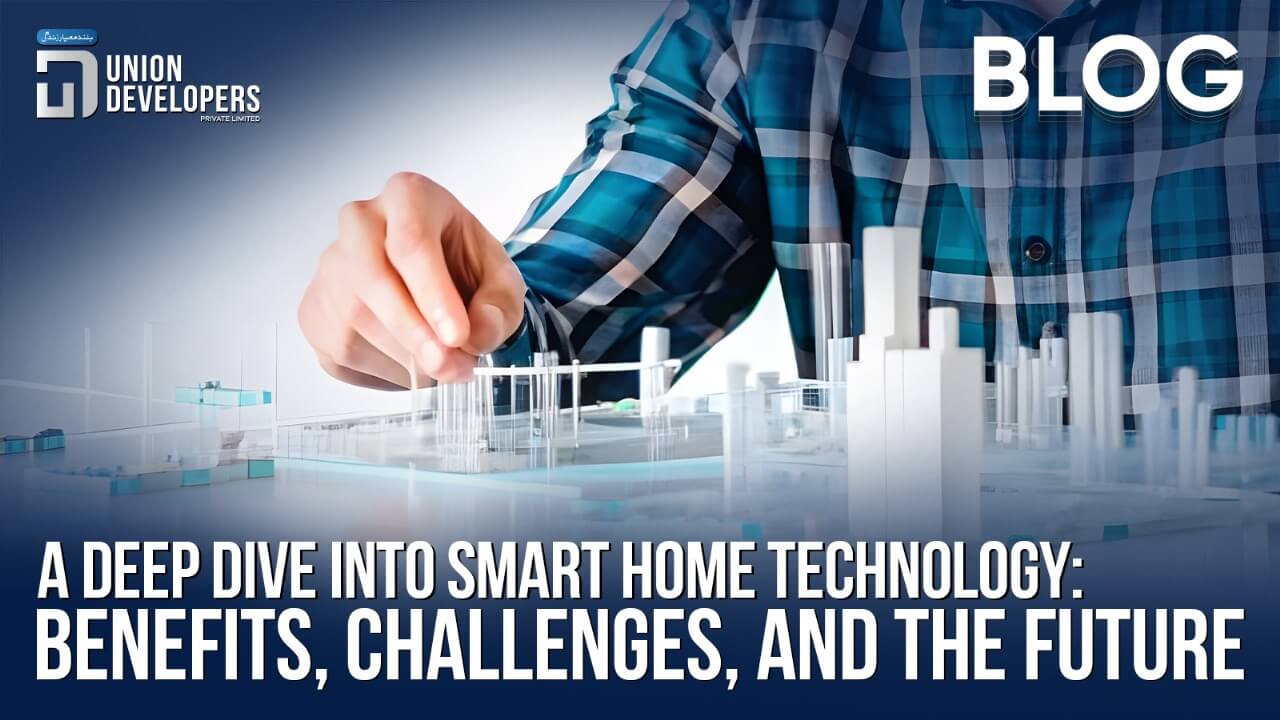Technology is advancing, and we can now see a lot of new tech serving us in many forms. Smart homes are a new concept that will change our lifestyle completely. In the future, all the houses will be smart houses, and life will be easier. A smart home uses internet-connected devices to enable the remote management and monitoring of appliances and systems like heating and lighting. In this blog, we will discuss smart homes and smart home technologies.
Smart home technology is referred to as home automation or domotics, which automates homes. It provides the homeowners’ comfort, security and convenience by giving control of smart devices. The residents use the smart home app on their personal computers or smartphones. Smart home systems, a part of the Internet of Things (IoT), and devices often operate together. These help to share consumer usage data and automate home actions.
Smart Home Technology
We use many devices to make our lives convenient, such as air conditioners, room temperature controllers, smart dishwashers, and more. But smart homes are not just a collection of these smart appliances or devices. The smart home has a system that makes these smart devices work together to create a remotely controlled home network.

All devices, such as thermostats, lights, appliances, and security systems, are controlled by a main home automation system controller; this is called a smart home hub. This hub is a hardware device that can control all the smart devices and appliances installed in the house. The smart home hub is like a central point of the smart house and can process and sense the data and communicate wirelessly.
The single smart home app is what you will love because it combines all the smart home devices. The homeowner can control their devices on this single app and can apply any changes if they are away from home.
Smart home hubs include Google Home, Amazon Echo, and Wink Hub. Many smart home devices use Bluetooth and Wi-Fi for connection, while some might depend on wireless protocols such as Z-Wave and Zigbee.
Smart home devices can be programmed to perform specific scheduled tasks or follow commands. They can also be set to respond to voice commands with Amazon Alexa or Google Assistant. For example, a smart thermostat can know the homeowner’s habits and automatically adjust the temperature.
Also Read: The Transformative Power of Artificial Intelligence
Examples of Smart Home Technologies
Now technology has entered every aspect of our lives, from domestic space to professions. Now let’s have a look at some of the smart home technology examples to understand it better.

Smart TVs:
These televisions connect to the internet to gain content access through apps, like on-demand videos and music. Some smart TVs also include gesture or voice recognition. Most of the new LEDs have voice recognition features to play anything on demand.
Smart Lighting System:
This can be controlled, customised, or remotely. Smart lighting systems can detect when residents are in the room and adjust lighting as needed. Smart lightbulbs can adjust themselves according to daylight availability.
Smart Thermostats:
These are really important for homeowners because the temperature needs to be adjusted very often. These smart thermostats, like Google Nest, come with Wi-Fi, letting users monitor, schedule, and remotely control home temperature. These devices also learn homeowners’ behaviours and modify them automatically. These also remind the users to change the filters and also report energy use.
Smart Security Cameras:
Security is paramount for every homeowner, so the new Revo technology like, like smart security cameras, can monitor their homes when they are away. Interestingly, smart motion sensors can identify the difference between visitors and intruders. It can send you notifications to authorities if any suspicious behaviour is found or detected.
Smart Door Locks:
Homeowners can use smart locks to deny access to any visitors or to allow their family members in their absence. Smart locks can also detect the resident’s proximity and unlock doors for them.
Smart Plugs:
These are connected to wall sockets to transform simple home devices like ceiling fans and lamps. You can control them remotely via apps and voice assistants like Alexa.
Smart Lawn and Pet Care:
Those who keep their pets at home can get the best benefits of smart pet care. They can feed their pets with automatic feeders. Lawns and houseplants can be watered with set timers as well.
Smart Kitchen Appliance:
The kitchen is the main part of the house and everyone wants to manage their kitchen fabulously. Now you can get smart appliances of any kind, such as smart coffee makers. Smart refrigerators, slow cookers and smart toasters. In the laundry room, you can have smart dryers and washing machines. Companies like Revo Technologies are driving innovation in smart home technology, offering cutting-edge solutions that enhance connectivity, security, and energy efficiency.
Pros and Cons of Smart Homes
| Pros | Cons |
| Smart Home ensures you can control all devices and appliances remotely. It accommodates the homeowner’s preferences for convenience. IoT devices enable the authorised members to control the smart home system remotely as well. It provides convenience and efficiency in regular home chores. It helps to save energy, water and other resources. | Smart homes require reliable internet connections because, without them, you can’t connect to gadgets. Some people can face complexity while operating the smart tech system and manufacturers are working on reducing it. Some of the IoT devices might lack built-in encryption. Expenses can be higher for many people because of the automatic system and devices. New technology is always more expensive than the old appliances. |
Lastly,
The smart buildings and homes have a bright future. Future developments in smart home technology will combine virtual assistants and language models, like generative AI. Some companies are already using this technology to build their personal solutions. Amazon is also working on a significant language model known as a large language model to improve Alexa. When you choose the IoT communication protocol, it is important to recognise that not all protocols fit every deployment or device. You can also build your own smart home by partnering with the best property builders in Pakistan.





